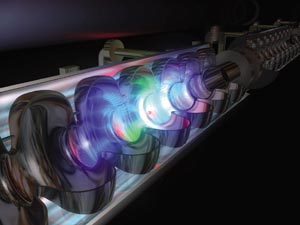
On 15 July 2002 the German Science Council published its evaluation of large-scale facilities for basic research in natural science. The council gave the TESLA superconducting linear electron-positron collider, planned by Hamburg’s DESY laboratory and a host of international partners, a strong nod of approval, deeming the project to be worthy of support subject to a number of conditions. The council requested a detailed proposal for TESLA to include the vital aspect of international participation, and requested a revised technical proposal for the TESLA X-ray laser based on a separate linear accelerator. In its statement the council stressed that TESLA is a world-leading development test-bed for superconducting linear accelerators, RF components and linac-driven free electron lasers, and that the technical aspects of the project have reached a high degree of maturity.
Development work for the TESLA project is currently being carried out within a large international collaboration under the overall leadership of DESY. Some 45 institutes from 11 countries are involved in developing and testing the TESLA accelerator and free electron laser technology. According to the TESLA Technical Design Report, published in March 2001, TESLA would be constructed as a linear collider with integrated X-ray lasers – two 15 km linear accelerators would face each other in a 33 km tunnel. Particle physics experiments would be located in the middle of the facility, while the electron accelerator would also serve as a driver for X-ray free electron lasers (X-FEL).
In October 2001 an option was added to the proposal according to which a separate linear accelerator would be built for the X-FEL to avoid direct coupling with the linear collider, thus bringing increased planning and operation flexibility. The separate linear accelerator for the X-FEL would be set up in an additional 5 km tunnel parallel to the main accelerator.
The German Science Council’s endorsement of the TESLA project brings with it a strong vote of confidence for particle physics and for a future linear collider. Along with the Japan Linear Collider and the US-based Next Linear Collider, TESLA is one of three projects preparing for such a machine. Particle physicists around the world are broadly united in the belief that a linear collider is the next logical step for particle physics to follow CERN’s Large Hadron Collider. For DESY in particular the endorsement is an important landmark, because it gives the laboratory the encouragement to try to build international support around its TESLA proposal.








